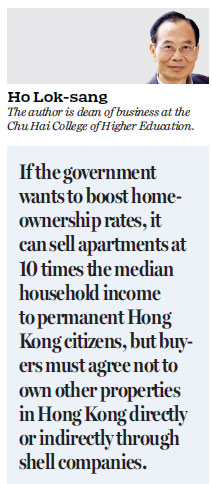Public housing sales must benefit needy
Updated: 2017-11-01 05:51
(HK Edition)
|
|||||||||
Ho Lok-sang points out schemes which create big capital gains will lead profiteers to join already lengthy queue for homes
In her maiden Policy Address Chief Executive Carrie Lam Cheng Yuet-ngor gave considerable coverage to the housing problem in Hong Kong. In a follow-up interview, Lam indicated she would opt for owner-occupied housing as the predominant mode of government-assisted housing in future. About the same time, Our Hong Kong Foundation proposed the government sell apartments at the development cost, estimated at HK$1 million, and allow resale with land cost repayment capped at valuation on the day of the original purchase. Thus an apartment with a market value of $4 million sold at $1 million could be resold in the open market on repayment of $3 million, regardless of how high land costs had gone up. Suppose the market value of an apartment, say 10 years from now, is $10 million. The original buyer can resell on repayment of $3 million, and pocket the capital appreciation of $6 million.

I have no objection to the government selling public housing. But public policy should be cost-effective, and must be effective in terms of serving the policy objective intended, which in this case is helping target-group households have accommodation that meets stipulated standards. The reason the government supplies rental or Home Ownership Scheme (HOS) housing is that some people cannot afford private housing. If a publicly funded housing unit is sold in the open market, it will no longer be available to serve those in the target group that the government wants to assist. The government will then need extra resources to replace the unit that has been lost to those outside the target group.
For this reason, I have always insisted that while the government can sell public housing, resale of public housing should always be limited to those who belong to the target group that the public housing is intended for. If units are sold at a deep discount from the market price and can be resold for a handsome profit, profit-seekers will no doubt join the queue. This will make the wait for those with genuine housing needs much longer, defeating the purpose of helping the neediest.
Actually, the two-track system we have had since 1978 - with HOS housing alongside Public Rental Housing (PRH) - is a time-tested model that has run really well. It was, for one thing, eminently sustainable. For years the Housing Authority was making a profit from sales of HOS housing and this profit more than covered the development and maintenance costs for PRH. But then in December 1997 the Tenant Purchase Scheme was announced. The Housing Authority offered to sell the PRH units to sitting tenants at deep discounts from the market price. This was a bombshell that dramatically reduced the attractiveness of HOS housing so for the first time in its history, many forfeited deposits they had made to buy HOS housing.
Our Hong Kong Foundation proposes that all new public housing units can be sold at cost excluding land cost to qualified purchasers. Since huge capital gains are almost guaranteed, the proposed scheme is immensely attractive. But the scheme is also eminently unfair. It is unfair to those who have genuine housing needs and still cannot afford to buy, as they will have to wait longer. It is also unfair to those who eventually pay the market price to buy these apartments in the open market. Just as it is well known that people hide their wealth and/or under-report incomes in order to apply for PRH or avoid being labeled a wealthy tenant, so it is expected that some buyers of those apartments may fake their asset positions and incomes. Those who actually pay the market price to buy are likely to be honest taxpayers. They will legitimately ask: Why does taxpayers' money end up boosting some people's wealth at their expense?
If the government wants to boost homeownership rates, it can sell apartments at 10 times the median household income to permanent Hong Kong citizens, but buyers must agree not to own other properties in Hong Kong directly or indirectly through shell companies. These should be starter homes so their sizes are relatively small; should their owners be able to afford better homes they would move out. Resale of these apartments must also be limited to first-time buyers who are Hong Kong permanent citizens and who also agree to similar terms of resale. These restrictions will screen out wealthy households who seek capital gains, and will improve the cost-effectiveness of the scheme.
I have reservations for having a target homeownership rate. A higher homeownership rate is desirable, of course, other things being equal. But why should we sacrifice the welfare of low-income households who will have to wait longer to be given a PRH apartment because profit-seekers join the queue or because some apartments are lost to non-target-group buyers?
(HK Edition 11/01/2017 page8)